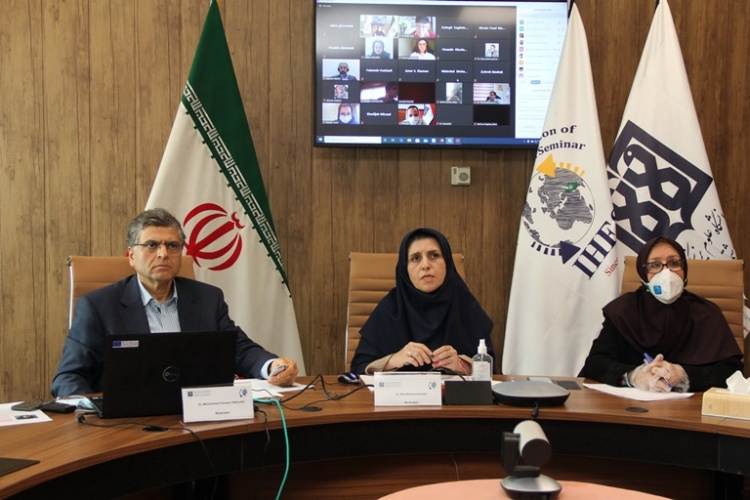Holding the Second Day of the Symposium-Webinar on “Internationalization of Higher Education” with Focus on Distance Education During and After Coronavirus Crisis

Opening the session, Dr. Rita Mojtahedzadeh, Vice Dean for International Affairs at the TUMS Virtual School and moderator of the Second Panel of the symposium-webinar on “Internationalization of Higher Education During and After Coronavirus Crisis”, and one of the speakers, stated that more than 230 participants attended the panel online.
Dr. Mojtahedzadeh, who co-hosted this panel with Dr. Nekoofar (the TUMS' Director of International Relations) and Dr. Sholeh Bigdeli (a faculty member at Iran University of Medical Sciences), stated: “Lectures of this panel were presented by Dr. Victoria Daskalou (from the University of Patras, Greece), Dr. Hasnain Zafar Baloch (from the International Medical University, Malaysia), Dr. Amer Saleem Elameer (from the University of Information and Communication Technology, Iraq), Dr. Amir Hooman Kazemi Motlagh and myself (from TUMS, Iran)”.
Dr. Mojtahedzadeh briefly introduced the speakers and the topic of their speech as follows:
-
As the first speaker, Dr. Daskalou described the challenges and opportunities of distance learning in higher education during the COVID-19 crisis and described Greece's experience in e-learning, the challenges ahead and the ways and strategies to address them.
-
In the second lecture on the subject of combined implementation of online learning in right way during COVID-19, Dr. Hasnain Zafar Baloch explained how to use remote models for the teaching and learning process to meet the needs of universities and science centers, and also introduced designs and models capable of simulating clinical learning environments.
-
Dr. Amer Saleem Elameer, who is currently in charge of developing e-learning in Iraq, explained about the experiences of Iraqi universities that had taken steps to provide infrastructure for distance learning even before COVID-19, and the optimal use of these facilities during COVID-19.
-
Another speaker, Dr. Kazemi, who is a visiting professor at Chinese universities and is collaborating with Chinese universities, shared with the audience the experiences he has gained from interacting with the Chinese scientific centers about online education.
-
Dr. Rita Mojtahedzadeh’s speech was about the experience of implementing e-learning in Iranian medical sciences universities before and during the COVID-19 crisis. she fully introduced the national projects in the field of e-learning such as Navid and Arman systems, and also about the infrastructure, software, hardware, regulations, incentives and in general the planning that has been set up at the national level for medical universities.
Furthermore, a Discussion Panel was held on the second day of the symposium-webinar. In the discussion panel, Dr. Sholeh Bigdeli from Iran University of Medical Sciences, Dr. Afsaneh Sharif from the University of British Columbia in Canada and Dr. Maria Susy Rogers from the University of South Wales in the UK, as the panelists during this part, shared their personal experiences about e-learning and distance learning, and spoke about the challenges they had confronted. Subsequently, other participants got chance to share their opinion and raise their questions.
Dr. Mojtahedzadeh also emphasized that according to the points raised during the second day of the symposium, the lack of infrastructure and technical facilities, insufficient familiarity of professors with online education, lack of a clear strategy for holding final exams for students, how to conduct clinical and practical training of students and how to evaluate the provided training are the most important challenges of universities and scientific centers in implementing e-learning.
“Iranian universities are not behind the world in terms of e-learning and infrastructure, and most scientific centers have similar challenges and even opportunities to take advantage of this form of education, and only because of the conditions, facilities, culture and structure that each country has, measures and the activities have been somewhat different” she indicated.
Dr. Mojtahedzadeh concluded that Internationalization at Distance, as a term that has been used for several years in the field of internationalization of higher education, has found its true meaning and has been considered today, and will be one of the main solutions to advance the goals of internationalization of universities during COVID-19 crisis and post-COVID-19 phase.

Your Comment :